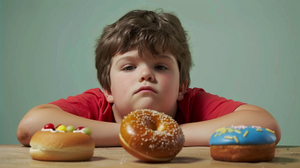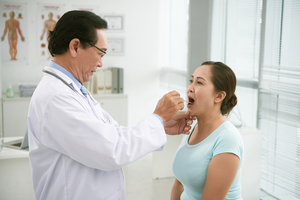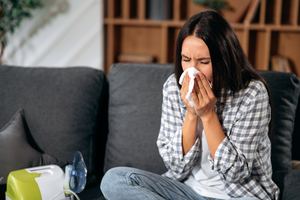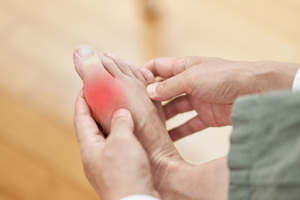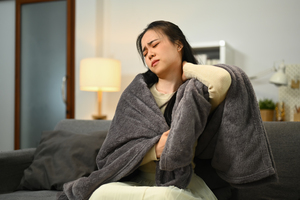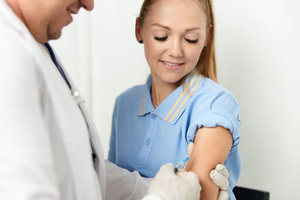Key points
- Children can safely take allergy medications, but the type, dosage, and age are crucial factors. Over-the-counter allergy medications often come in pediatric formulas.
- Antihistamines, nasal sprays, and eye drops are common allergy medicines for kids. They are safe and effective when used correctly and based on a child's age, symptoms, and sensitivity.
- Never give a child multiple allergy medications at once unless directed by a doctor. Always read the label for age-appropriate dosing and use the proper measuring tool for liquid medications.
- If a child's allergy symptoms don't improve or get worse, it's important to consult a healthcare provider. Also, always consult a pediatrician before giving allergy medications to toddlers or infants.
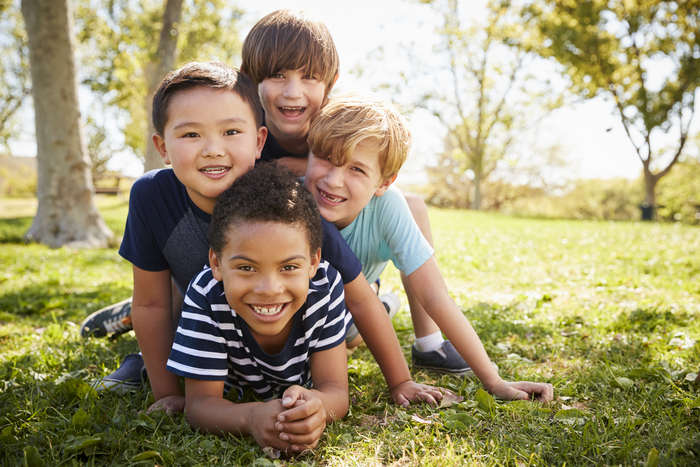
As soon as the weather warms up, many families start to notice the familiar signs — sneezing fits, itchy eyes, and runny noses that seem to pop up out of nowhere. Spring allergies are incredibly common in children, often triggered by pollen from blooming trees, fresh-cut grass, and even mold spores that thrive in damp areas. While these seasonal changes can be beautiful, they also bring discomfort that can seriously disrupt a child’s sleep, focus at school, and ability to enjoy daily activities.
For parents, navigating allergy season can feel overwhelming. With so many medications on the shelves and conflicting advice online, it’s not always clear what’s safe or effective, especially for toddlers and young children. The good news is there are safe ways to relieve your child’s allergy symptoms and help them breathe easier this spring.
Can kids take allergy medications?
Yes — kids can safely take allergy medications, but the type, dosage, and age all play a crucial role, according to the Children’s Hospital of Philadelphia (CHOP). Most over-the-counter (OTC) allergy meds come in pediatric formulas or offer dosing instructions based on a child’s age and weight. You’ll find options like liquid antihistamines for toddlers and chewable tablets for older kids.
That said, it’s essential to follow age-specific guidelines closely. Giving the wrong dose or using a product meant for adults can lead to side effects or reduced effectiveness. When in doubt, always check with your child’s doctor to make sure you’re using the right medication for their age and symptoms.
Best allergy medicines for kids
There’s no one-size-fits-all allergy medicine for children, but many over-the-counter (OTC) options are both safe and effective when used correctly. The key is choosing the right type of medication based on your child’s age, symptoms, and sensitivity. Below are the most commonly used allergy medicines for kids, broken down by symptom type:
Antihistamines
These are often the first line of defense for common allergy symptoms like sneezing, an itchy nose, runny eyes, or skin reactions). Popular non-drowsy choices include:
- Children’s Claritin (loratadine): 24-hour relief, non-drowsy, approved for ages 2+
- Children’s Zyrtec (cetirizine): Fast-acting, slightly sedating for some kids, approved for ages 2+
- Children’s Allegra (fexofenadine): 12- or 24-hour relief, non-drowsy, approved for ages 2+
These are available in liquid form for toddlers and chewable tablets for older children.
Nasal sprays
Best for nasal congestion, sinus pressure, and inflammation that doesn’t respond well to antihistamines alone.
- Flonase Sensimist for Children (fluticasone): A gentle steroid nasal spray for kids 4 and up
- Children’s Nasacort (triamcinolone): Another OTC nasal spray option, often approved for ages 2+
These sprays take a few days to work fully, so they’re best used daily during peak allergy season.
Eye drops
If your child suffers from red, itchy, or watery eyes due to pollen or other allergens, antihistamine eye drops can help. Ketotifen-based drops (e.g., Zaditor or Alaway) are available OTC and may be used in kids 3 and up (check the label). Prescription drops may be needed for more severe eye symptoms.
Safety reminders about giving your child allergy medication
CHOP explains that you should never give your child multiple allergy medications at once unless directed by a doctor. Some products contain overlapping ingredients, and combining them can lead to side effects like excessive drowsiness, irritability, or dry mouth. They also explain that parents should always read the label carefully to confirm age-appropriate dosing and use the proper measuring tool for liquid medications. If your child is under 2 years old or has other medical conditions, talk to a pediatrician before starting any allergy treatment.
Signs it’s time to see a doctor for your child’s allergies
Most spring allergies in kids can be managed with over-the-counter medication and simple at-home care. But there are times when professional guidance is necessary. If your child’s symptoms don’t improve — or seem to get worse — it’s important to check in with a healthcare provider.
Here are some signs it’s time to schedule a doctor’s visit, according to CHOP:
- Symptoms aren’t improving with OTC allergy meds: If your child is still sneezing, coughing, or waking up congested after a week or two of consistent treatment, it could mean they need a different approach or prescription-strength relief.
- Allergies affect breathing: Wheezing, frequent coughing, shortness of breath, or rapid breathing could point to allergic asthma. This requires prompt medical evaluation and a long-term management plan.
- You suspect allergic asthma: If your child has a history of allergies and is now experiencing nighttime coughing, chest tightness, or trouble keeping up during physical activity, they may be developing asthma symptoms triggered by allergens.
- Your child is under 2 years old: Always consult a pediatrician before giving allergy medications to toddlers or infants. Young children often need special care, and many OTC allergy products are not approved for use under age 2.
Tip: You can book same-day visits at many urgent care clinics using Solv — especially helpful if symptoms show up suddenly or over the weekend.
At-home allergy relief tips for kids
In addition to medication, small daily habits can make a big difference in reducing your child’s exposure to spring allergens. Try these simple, safe strategies to help minimize symptoms at home:
- Keep windows closed during high pollen times (typically early morning and on windy days). Use air conditioning instead to help filter out allergens.
- Use air purifiers with HEPA filters in bedrooms and living spaces to trap pollen, pet dander, and dust mites.
- Bathe and change clothes after outdoor play. Pollen can stick to skin, hair, and clothing — even in small amounts.
- Wash bedding regularly in hot water to remove allergens that collect on pillows and sheets.
- Check daily pollen counts through weather apps or allergy trackers, and plan outdoor time when levels are lower.
Book a same-day visit for allergy relief near you
If your child’s allergy symptoms aren’t getting better or you’re unsure which medicine is safe to use, it’s always okay to ask for help. Many urgent care clinics and pediatric providers offer same-day and next-day appointments — perfect for busy families during allergy season. Use Solv to find trusted providers near you and book an appointment in just a few clicks!
FAQs
Can children safely take allergy medications?
Yes, children can safely take allergy medications. However, it's important to consider the type of medication, the dosage, and the child's age. Most over-the-counter allergy medications come in pediatric formulas or have dosing instructions based on a child's age and weight. Always follow age-specific guidelines and consult with a healthcare provider if unsure.
What are some safe and effective allergy medicines for children?
There are several over-the-counter options that are both safe and effective for children when used correctly. Antihistamines such as Children’s Claritin, Children’s Zyrtec, and Children’s Allegra can be used for common allergy symptoms. Nasal sprays like Flonase Sensimist for Children and Children’s Nasacort are good for nasal congestion and sinus pressure. Antihistamine eye drops can also help if your child suffers from red, itchy, or watery eyes due to allergies.
What precautions should be taken when giving a child allergy medication?
You should never give your child multiple allergy medications at once unless directed by a doctor as some products contain overlapping ingredients and combining them can lead to side effects. Always read the label carefully to confirm age-appropriate dosing and use the proper measuring tool for liquid medications. If your child is under 2 years old or has other medical conditions, consult with a pediatrician before starting any allergy treatment.
When should I seek professional help for my child's allergies?
If your child’s symptoms don’t improve or seem to get worse after a week or two of consistent treatment, it's time to consult a healthcare provider. Other signs that require professional guidance include breathing difficulties, suspected allergic asthma, or if your child is under 2 years old.
What are some at-home allergy relief tips for children?
In addition to medication, small daily habits can help reduce your child’s exposure to spring allergens. These include keeping windows closed during high pollen times, using air purifiers with HEPA filters, bathing and changing clothes after outdoor play, washing bedding regularly in hot water, and checking daily pollen counts through weather apps or allergy trackers.

